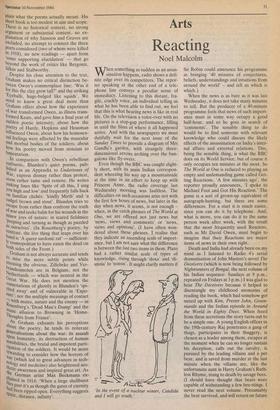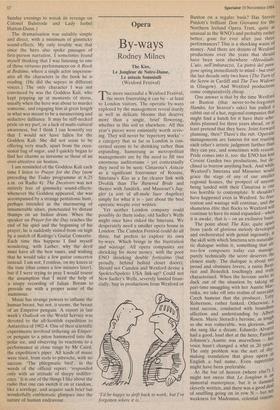Arts
Reacting
Noel Malcolm
when something as sudden as an assas- sination happens, radio shows a defi- nite edge over its competitors. The repor- ter speaking at the other end of a tele- phone line conveys a peculiar sense of immediacy. Listening to this distant, fra- gile, crackly voice, an individual telling us what he has been able to find out, we feel that this is what hearing news is like in real life. On the television a voice-over with no pictures is a stop-gap performance, filling in until the films of where it all happened arrive. And with the newspapers we must dutifully wait for the next issue of the Sunday Times to provide a diagram of Mrs Gandhi's garden, with strangely three- dimensional arrows arching over the bun- galows like fly-overs.
Even though the BBC was caught slight- ly short, with its main Indian correspon- dent wheezing his way up a mountainside at the time in an effort to keep up with Princess Anne, the radio coverage last Wednesday morning was faultless. The difficulties on such occasions arise not with the first few hours of news, but later in the day when news, it seems, is not enough – when, in the catch phrases of The World at One, we are offered not just news but 'news, views and comments' or 'news, views and opinions'. (I have often won- dered about these phrases. I realise that they indicate an ascending scale of import- ance, but I am not sure what the difference is between the last two items in them. Plato had a rather similar scale of types of knowledge, rising through `doxa' and 'di- anoia' to `noesis'. It might clarify matters if in the event of a nuclear winter, Candida and I will go south.' Sir Robin could announce his programme as bringing '40 minutes of conjectures, beliefs, understandings and intuitions from around the world' – and tell us which is which.) When the news is as bare as it was last Wednesday, it does not take many minutes to tell. But the producer of a 40-minute programme feels that news of such import- ance must in Some way occupy a good half-hour, and so he goes in search of 'comments'. The sensible thing to do would be to find someone with relevant knowledge who could discuss the likely effects of the assassination on India's inter- nal affairs and external relations. This, being the sensible thing, is what the BBC does on its World Service; but of course it only occupies ten minutes at the most. So The World at One is reduced to playing an empty and undemanding game called Get- ting Reactions. 'A few minutes ago', the reporter proudly announces, 'I spoke to Michael Foot and Got His Reaction.' The game is a sort of grown-up equivalent of autograph-hunting, but there are some differences. For a start it is much easier, since you can do it by telephone. And, what is more, you can do it to the same person week after week, with the result that the most frequently used Reactors, such as Mr David Owen, must begin to imagine that their Reactions are major items of news in their own right.
Death and India had already been on my mind as I listened to Radio 4's serial dramatisation of John Masters's novel The Deceivers (which is now being followed by Nightrunners of Bengal, the next volume of his Indian sequence: Sundays at 9 p.m., repeated on Fridays at 3 p.m.) I was glad to hear The Deceivers because it helped to disentangle my childhood memories of reading the book, which had somehow got mixed up with Kim, Prester John, Green- Mantle and the Indian episode in Around the World in Eighty Days. When freed from these accretions the story turns out to be a simple one. A young English officer in the 19th-century Raj penetrates a gang of thugs, participates in their thuggery, is chosen as a leader among them, escapes at the moment when he can no longer sustain his deception, calls out the cavalry, is pursued by the leading villains and a pet bear, and is saved from murder at the last minute when the villains are, like the unfortunate aunt in Harry Graham's Ruth- less Rhyme, stung to death by savage bees. (I should have thought that bears were capable of withstanding a few bee-stings. I never read the next volume. Presumably the bear survived, and will return on future Sunday evenings to wreak its revenge on Colonel Bulstrode and Lady Isobel Hatton-Dunn.) The dramatisation was suitably simple and direct, with a minimum of gimmicky sound-effects. My only trouble was that since the hero also spoke passages of first-person narration, I sometimes found myself thinking that I was listening to one of those virtuoso performances on A Book at Bedtime, where a single actor imperson- ates all the characters in the book he is reading. (He did the sepoys in different voices.) The only character I was not convinced by was the Goddess Kali, who kept popping up at moments of stress, usually when the hero was about to murder someone, and engaging him at great length in what was meant to be a mesmerising and seductive dalliance. It may be stiff-necked pride on my part, or a lack of multi-cultural awareness, but I think I can honestly say that I would not have fallen for the Goddess Kali. She did not seem to be offering very much, apart from the occa- sional bag of sugar, and I quickly began to find her charms as tiresome as those of an over-attentive air hostess.
I am reminded of the Goddess Kali each time I listen to Prayer for the Day (now preceding the Today programme at 6.25 a.m. on Radio 4). The Deceivers was not entirely free of gimmicky sound-effects: whenever the Goddess appeared, she was accompanied by a strange pentatonic hum, perhaps intended as the murmuring of innumerable sitars, punctuated by distant thumps on an Indian drum. When the speaker on Prayer for the Day reaches the end of his spiel and the beginning of his prayer, he is suddenly visited from on high by a snatch of Rodrigo's Guitar Concerto. Each time this happens I find myself wondering, with Luther, why the devil must have all the best tunes, and wishing that he would take a few guitar concertos instead. I am not, I confess, on my knees at the time (that comes a few minutes later), but if I were trying to pray I would resent the assumption that I need the help of a soupy recording of Julian Bream to provide me with a proper sense of the numinous.
Music has strange powers to inflame the human breast, but not, it seems, the breast of an Emperor penguin. A report in last week's Outlook on the World Service was devoted to the all-Scottish expedition to Antarctica of 1902-4. One of their scientific experiments involved tethering an Emper- or penguin to a piton hammered into the polar ice, and observing its reactions to a performance at close range by Mr Caird, the expedition's piper. All kinds of music were tried, from reels to pibrochs, with no success. 'The phlegmatic bird', in the words of the official report, 'responded only with an attitude of sleepy indiffer- ence.' It is one of the things I like about the radio that one can switch it on at random, like a sortilege, and acquire such brief but wonderfully emblematic glimpses into the nature of human endeavour.















































 Previous page
Previous page